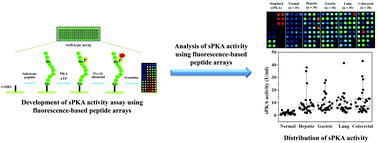A peptide array-based serological protein kinase A activity assay and its application in cancer diagnosis
Abstract
Protein kinase A (PKA) plays a crucial role in several biological processes; however, there is no assay with sufficient sensitivity and specificity to determine serological PKA (sPKA) activity. Here we present an on-chip activity assay that employs cysteine-modified kemptide arrays to determine specific sPKA activity in human sera that eliminates the potential contributions of other kinases with a protein kinase peptide inhibitor. The sensitivity of the on-chip sPKA activity assay was greatly enhanced by Triton X-100, with a 0.01 U mL−1 detection limit. sPKA activity was determined by subtracting nonspecific sPK activity from total sPK activity. Our assay provided greater sensitivity and specificity and more accurate area under the curve values for gastric cancer compared to the total sPK activity assay. sPKA activities in human sera from patients with hepatic (n = 30), gastric (n = 30), lung (n = 30), and colorectal (n = 30) cancers were significantly higher than those in controls (n = 30, p < 10−4), but no significant difference in sPKA activities between normal and inflammation groups was observed. These results demonstrate that the on-chip assay accurately measures sPKA activity in human sera and that the sPKA activity may be a potential biomarker for cancer diagnosis.


 Please wait while we load your content...
Please wait while we load your content...